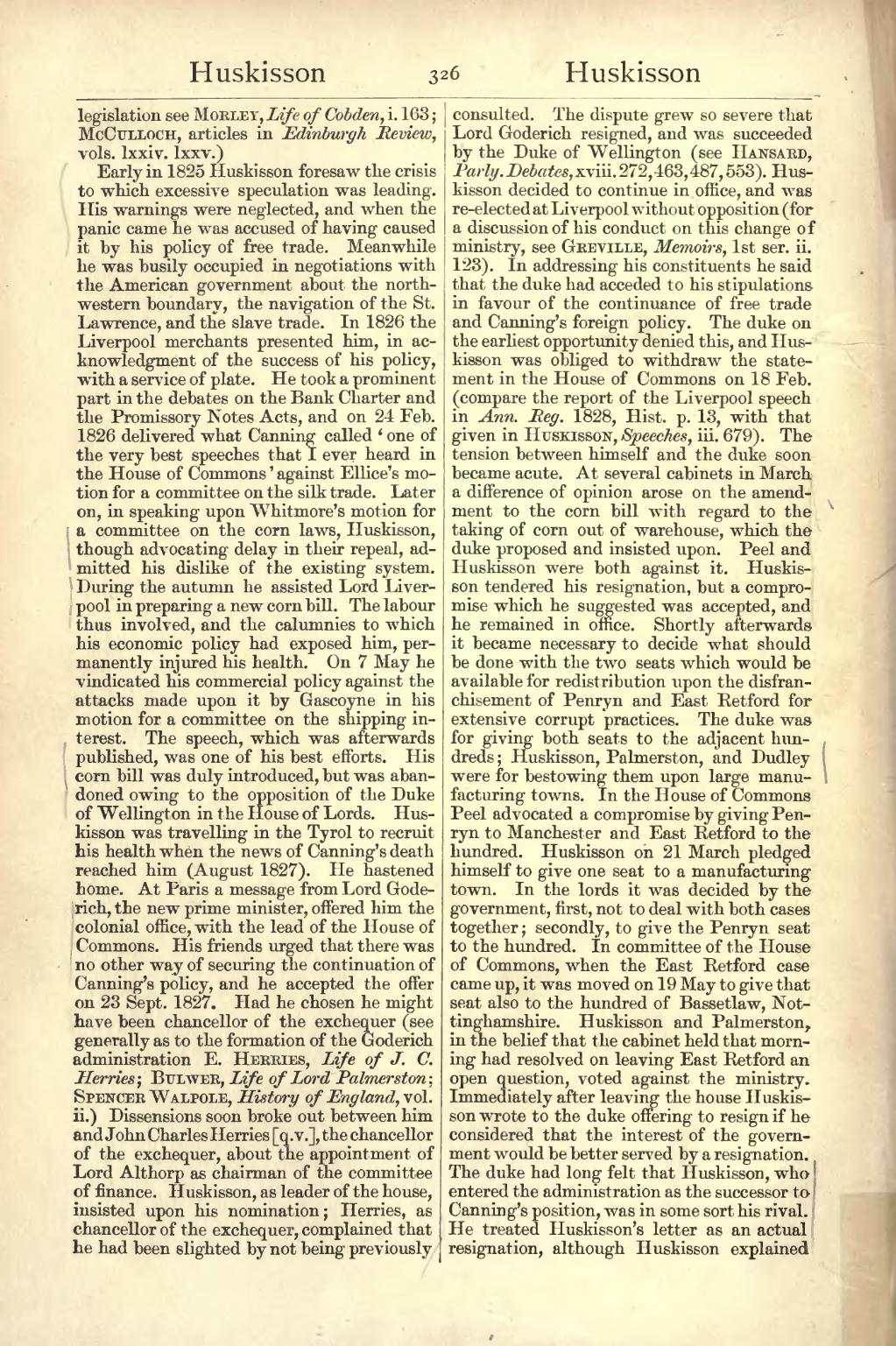legislation see Morley, Life of Cobden,i. 163; McCulloch, articles in Edinburgh Review, vols. lxxiv. lxxv.)
Early in 1825 Huskisson foresaw the crisis to which excessive speculation was leading. His warnings were neglected, and when the panic came he was accused of having caused it by his policy of free trade. Meanwhile he was busily occupied in negotiations with the American government about the northwestern boundary, the navigation of the St. Lawrence, and the slave trade. In 1826 the Liverpool merchants presented him, in acknowledgment of the success of his policy, with a service of plate. He took a prominent part in the debates on the Bank Charter and the Promissory Notes Acts, and on 24 Feb. 1826 delivered what Canning called 'one of the very best speeches that I ever heard in the House of Commons' against Ellice's motion for a committee on the silk trade. Later on, in speaking upon Whitmore's motion for a committee on the corn laws, Huskisson, though advocating delay in their repeal, admitted his dislike of the existing system. During the autumn he assisted Lord Liverpool in preparing a new corn bill. The labour thus involved, and the calumnies to which his economic policy had exposed him, permanently injured his health. On 7 May he vindicated his commercial policy against the attacks made upon it by Gascoyne in his motion for a committee on the shipping interest. The speech, which was afterwards published, was one of his best efforts. His corn bill was duly introduced, but was abandoned owing to the opposition of the Duke of Wellington in the House of Lords. Huskisson was travelling in the Tyrol to recruit his health when the news of Canning's death reached him (August 1827). He hastened home. At Paris a message from Lord Goderich, the new prime minister, offered him the colonial office, with the lead of the House of Commons. His friends urged that there was no other way of securing the continuation of Canning's policy, and he accepted the offer on 23 Sept. 1827. Had he chosen he might have been chancellor of the exchequer (see generally as to the formation of the Goderich administration E. Herries, Life of J. C. Herries, Bulwer, Life of Lord Palmerston; Spencser Walpole, History of England, vol.ii.) Dissensions soon broke out between him and John Charles Herries [q.v.], the chancellor of the exchequer, about the appointment of Lord Althorp as chairman of the committee of finance. Huskisson, as leader of the house, insisted upon his nomination; Herries, as chancellor of the exchequer, complained that he had been slighted by not being previously consulted. The dispute grew so severe that Lord Goderich resigned, and was succeeded by the Duke of Wellington (see Hansard, Party. Debates,xviii. 272,463,487,553). Huskisson decided to continue in office, and was re-elected at Liverpool without opposition (for a discussion of his conduct on this change of ministry, see Greville, Memoirs, 1st ser. ii. 123). In addressing his constituents he said that the duke had acceded to his stipulations in favour of the continuance of free trade and Canning's foreign policy. The duke on the earliest opportunity denied this, and Huskisson was obliged to withdraw the statement in the House of Commons on 18 Feb. (compare the report of the Liverpool speech in Ann. Reg. 1828, Hist. p.13, with that given in Huskisson, Speeches, iii. 679). The tension between himself and the duke soon became acute. At several cabinets in March a difference of opinion arose on the amendment to the corn bill with regard to the taking of corn out of warehouse, which the duke proposed and insisted upon. Peel and Huskisson were both against it. Huskisson tendered his resignation, but a compromise which he suggested was accepted, and he remained in office. Shortly afterwards it became necessary to decide what should be done with the two seats which would be available for redistribution upon the disfranchisement of Penryn and East Retford for extensive corrupt practices. The duke was for giving both seats to the adjacent hundreds; Huskisson, Palmerston, and Dudley were for bestowing them upon large manufacturing towns. In the House of Commons Peel advocated a compromise by giving Penryn to Manchester and East Retford to the hundred. Huskisson on 21 March pledged himself to give one seat to a manufacturing town. In the lords it was decided by the government, first, not to deal with both cases together; secondly, to give the Penryn seat to the hundred. In committee of the House of Commons, when the East Retford case came up, it was moved on 19 May to give that seat also to the hundred of Bassetlaw, Nottinghamshire. Huskisson and Palmerston, in the belief that the cabinet held that morning had resolved on leaving East Retford an open question, voted against the ministry. Immediately after leaving the house Huskisson wrote to the duke offering to resign if he considered that the interest of the government would be better served by a resignation. The duke had long felt that Huskisson, who entered the administration as the successor to Canning's position, was in some sort his rival. He treated Huskisson's letter as an actual resignation, although Huskisson explained
